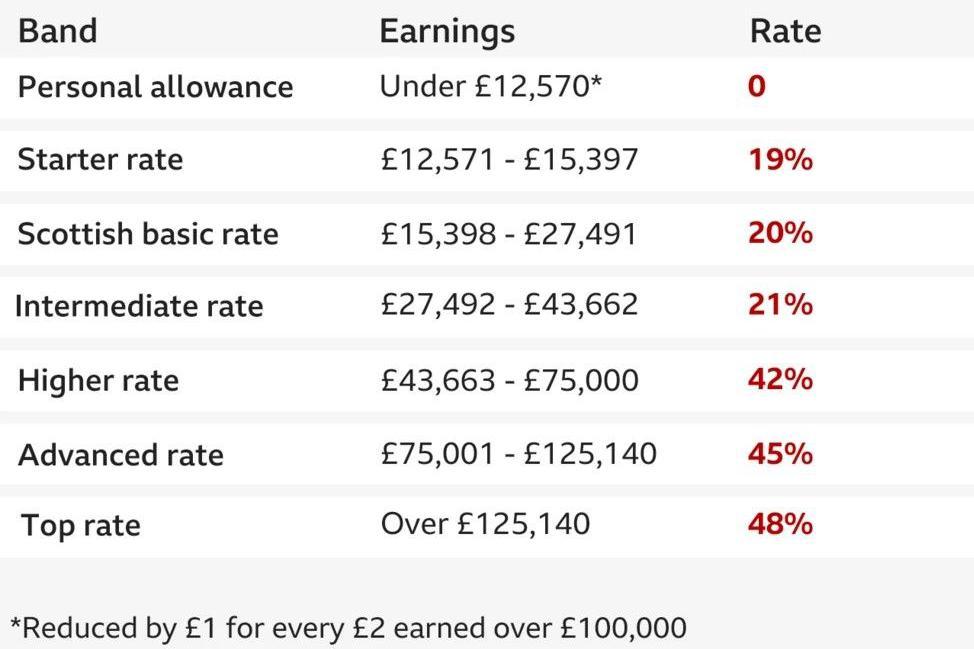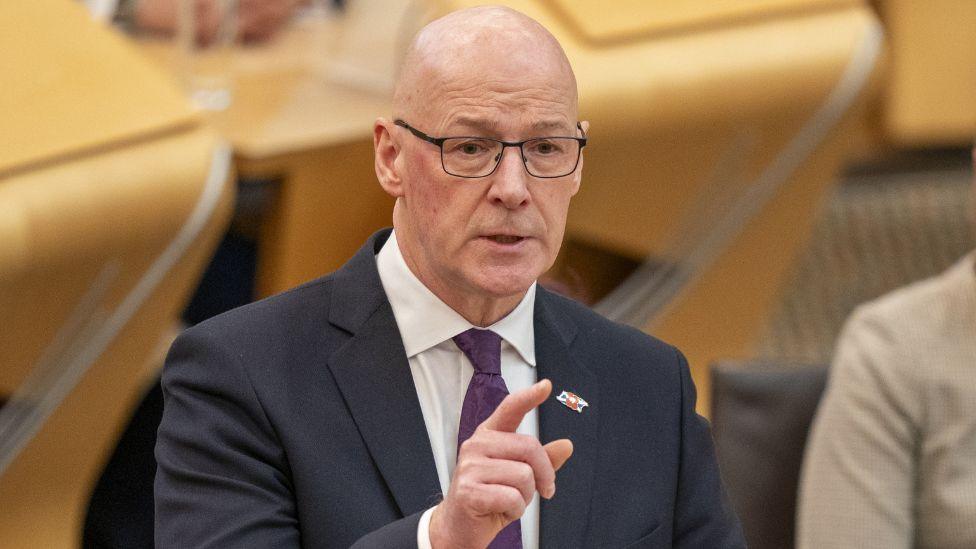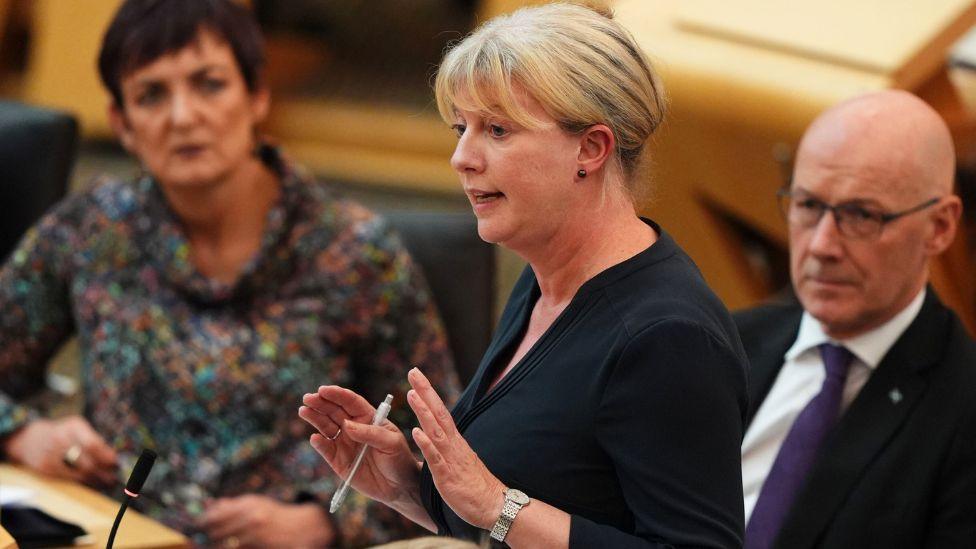Sarwar refuses to comment on UK tax hike speculation

Scottish Labour leader Anas Sarwar has led the party since 2021
- Published
Scottish Labour leader Anas Sarwar has refused to be drawn on speculation that Chancellor Rachel Reeves will raise UK income tax.
While an increase would not apply in Scotland - which has distinct bands and rates - it would lead to a cut in the Holyrood budget under devolved funding arrangements, known as the fiscal framework.
Scottish Finance Secretary Shona Robison has warned that she may "have to revisit" a promise not to raise income tax as a result.
Sarwar declined to explain how he would plug the budget gap if he became first minister following the Holyrood election in May.
The Scottish Labour leader, speaking at an event launching a report on economic growth in Scotland, external, repeatedly said he would not speculate about what was going to be in the chancellor's Autumn Budget, which will be announced on 26 November.
He highlighted that First Minister John Swinney had previously called on the UK government to increase income tax south of the border.
Finance secretary may have to 'revisit' no tax rise pledge
- Published9 November
Swinney does not rule out tax hikes in Scotland
- Published6 November
Sarwar described Swinney as "economically illiterate" and the "strongest advocate" for UK income tax rises.
"He's been arguing that for two years and he's the man that negotiated the fiscal framework," Sarwar told BBC Scotland News.
The Scottish Labour leader said that if he became first minister he wanted to "reduce the tax burden on our country and go hell for leather for growth".
He said he would achieve that through measures like city mayors, more co-operation with Westminster and speeding up the planning system.
Budget 'black hole'
It has been speculated that the chancellor might raise the basic rate of income tax in England, Wales and Northern Ireland by 2p, coupled with an equal cut in National Insurance, which would apply across the UK.
Swinney said that if the UK government raised taxes it would be doing so to "fill a black hole of their own making".
He predicted a hike would end up "punishing" Scotland's public finances and services.
"That's not what we've been calling for," the first minister told BBC Scotland News.
"What we've been calling for is taxation to be used to invest in our public services."
He added that economic growth was "at the heart" of his government's policy programme.
Scottish Conservative finance spokesman Craig Hoy said: "Economic growth is essential to pay for public services, but it will be impossible to achieve until we ditch the high-tax agenda of Labour and the SNP."

The Scottish government says its income tax system, which has seven bands to the UK's four, is fairer and more progressive than Westminster's.
People living in Scotland earning below about £30,300 pay slightly less income tax than they would elsewhere in the UK, with a maximum saving of about £28.
Above that threshold they pay increasingly more as earnings increase.
Someone on £50,000 in Scotland pays £1,528 more than they would in the rest of the UK. That rises to £5,207 for someone on £125,000.
However, economist Sir Anton Muscatelli - who was commissioned by Scottish Labour to write the economic growth report - found that Scotland's higher marginal income tax rates "could be a major disincentive in attracting high value jobs".
A former economic adviser to the Scottish government, he suggested that Holyrood ministers should aim to reduce "distortion" between the Scottish and UK income tax systems.

First Minister John Swinney has urged the UK government to increase spending on public services
In its 2024 manifesto, Labour pledged not to hike income tax, VAT or National Insurance.
However, in a pre-Budget speech last week, Reeves said she would make "necessary choices" after the world had "thrown more challenges our way".
Speaking to BBC Radio's 5 Live on Monday, the chancellor said that sticking with Labour's manifesto commitment would necessitate "deep cuts" in areas such as the capital budget, used for infrastructure.
"I will do what is right for our country," Reeves added.
"Sometimes that means not always the easy decisions but the decisions that I think are in the national interest."
What is the block grant adjustment?
While a UK income tax hike would not directly affect people in Scotland - because Holyrood ministers have used devolved powers to create a distinct system - it would lead to an automatic deduction from the Scottish Budget.
That is because under the fiscal framework the UK government is able to deduct funds from the block grant that it estimates it would have received if tax-raising powers were not devolved to Holyrood.
A rise in UK income tax would lead to an increase in the amount the Treasury would have levied in Scotland if its income tax rates applied north of the border.
That in turn would lead to a bigger deduction from the block grant, known as a block grant adjustment (BGA).
The Fraser of Allander Institute, an independent economic research unit at the University of Strathclyde, has estimated that a 2p increase in the basic rate of UK income tax would lead to a cut of about £1bn in Scotland's block grant in each of the next three financial years.
Unless the UK government increases spending in other areas, which would increase Scotland's block grant, Holyrood ministers would either have to raise taxes or make spending cuts to plug the gap.
Changes to National Insurance, which is not devolved, would apply directly in Scotland, and would not affect the BGA.
The Treasury has said it will not comment on speculation about the Budget, but insisted the chancellor was focused on providing economic stability and growth.
A spokesperson also said Scotland had received a record settlement in 2024-25.
The Scottish government will reveal its tax and spending plans on 13 January.
- Published4 November

- Published5 November
